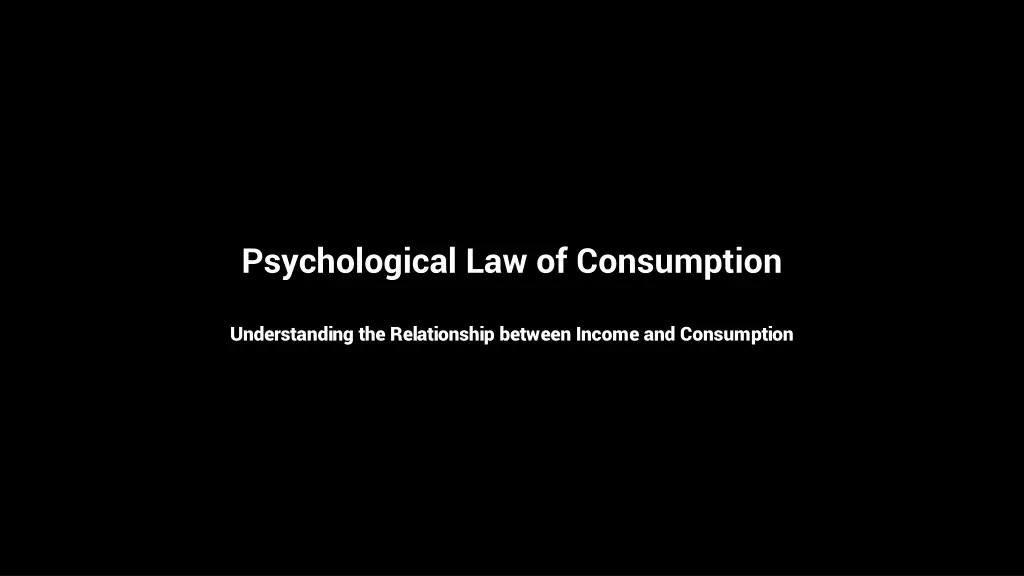
Understanding the Psychological Law of Consumption
Explore the relationship between income and consumption through concepts like marginal propensity to consume and average propensity to consume. Discover how consumption changes with income and the impact on economic activities during depression.
Download Presentation

Please find below an Image/Link to download the presentation.
The content on the website is provided AS IS for your information and personal use only. It may not be sold, licensed, or shared on other websites without obtaining consent from the author. If you encounter any issues during the download, it is possible that the publisher has removed the file from their server.
You are allowed to download the files provided on this website for personal or commercial use, subject to the condition that they are used lawfully. All files are the property of their respective owners.
The content on the website is provided AS IS for your information and personal use only. It may not be sold, licensed, or shared on other websites without obtaining consent from the author.
E N D
Presentation Transcript
Psychological Law of Consumption Understanding the Relationship between Income and Consumption
Introduction Welcome to the presentation on the Psychological Law of Consumption. In this presentation, we will explore the relationship between income and consumption. consumption. We will discuss various concepts such as marginal marginal propensity to consume and average propensity to consume. Let's dive in! Photo by Pexels Photo by Pexels
Marginal Propensity to Consume Marginal Propensity to Consume (MPC) measures measures the change in consumption due to a a change in income. If MPC is zero, there is no change in consumption consumption with an increase in income. If MPC is one, all additional income is consumed. MPC can be a value between zero and one, indicating the proportion of income that is consumed. Photo by Pexels Photo by Pexels
Average Propensity to Consume Average Propensity to Consume (APC) measures measures the proportion of income that is consumed consumed on average. If APC is one, all income is consumed. If APC is greater than one, consumption exceeds income, indicating borrowing or savings depletion. If APC is less than one, consumption is less than income, indicating savings or investment. Photo by Pexels Photo by Pexels
Psychological Laws of Consumption The Psychological Law of Consumption states that consumption is a function of income. As income increases, consumption also increases. However, the increase in consumption is somewhat smaller than the increase in income. This implies that the marginal propensity to consume is less than one. Photo by Pexels Photo by Pexels
Relationship between Consumption Expenditure and Income The relationship between consumption expenditure and income is not proportional. If consumption expenditure increases, income increases, but by a smaller amount. This relationship holds true for both average propensity to consume and marginal propensity to consume. The proportionality between consumption expenditure and income is not linear. Photo by Pexels Photo by Pexels
Depression and Investment Depression is a state of low economic activity characterized by decreased investment. Psychological Laws of Consumption help explain the behavior of consumption and investment during depression. During a depression, consumption and investment decrease, leading to a decline in income. The concept of investment multiplier plays a role in understanding income generation during a depression. Photo by Pexels Photo by Pexels
Absolute Income Hypothesis The Absolute Income Hypothesis states that current consumption is determined by current income. This hypothesis argues that consumption is not related to permanent income or disposable income. The consumption pattern remains the same regardless of changes in income distribution or circumstances. However, this hypothesis has been challenged by the Psychological Law of Consumption. Photo by Pexels Photo by Pexels
